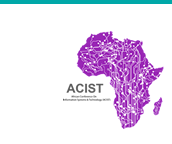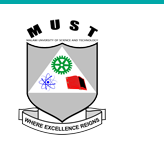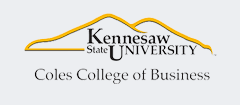The 10th Annual ACIST Proceedings (2024)
ISSN 2467-8988
PREFACE
On behalf of the Steering and Local Organizing Committees, plus other staff of Women's University in Africa who have been working diligently and effectively from last year, we welcome you to the 10th African Conference on Information Systems & Technology (ACIST) 2024.
The aim of ACIST is to provide a forum for researchers, practitioners and educators to present and discuss the most recent innovations, trends, experiences and concerns in all kinds of technology. Discussions cover information and communication technology (ICT) and allied areas such as electrical and electronic engineering, computer science, computer engineering, and information systems. Recent advances in artificial intelligence (AI) and increasing uptake in Africa hold significant promise for socio-economic development. At the same time, it increases the need for African people to have control over how and when digital data and technologies about them are processed and used with a human-centred approach. At ACIST, we believe that there is a great danger for the increasing uptake of AI in Africa to push our people to the periphery. Such an imbalance of power in favour of digital technology can create a range of both societal and economic problems, and the best way to address these is an approach which places Africans in the centre.
In an era of unprecedented strides in digital innovation, ACIST 2024 seeks to explore how and why a human-centred approach can and does ensure the well-being of African people. How can we think and act in such a manner that the ultimate aim of any digital innovation is to make African lives happier? What should African businesses, governments and individuals be doing to make modern digital resources become more efficient and productive for our people. How can we use scientific research to inform and persuade African states and development partners to implement what the United Nations calls a Human Rights Based Approach to digital transformation? These are a few critical questions that remind us to keep African people in the centre of digital innovation.
The conference theme, Human Centredness in African Digital Futures, is therefore meant to help us envision an African future where digital technology delivers outcomes such as development in freedom, improved life quality, equitable progress, and pan-African access to food, housing, education and health. ACIST brings together a diverse cohort of scholars to forge a collective path toward an African future where its people are digitally empowered with realized human aspirations. By cultivating a shared understanding of our roles in digital innovation, the conference endeavours to chart a course where African digital futures are not solely focused on technical capabilities, but also consider ethical, social, and cultural implications.
In this 10th edition of ACIST, we invited scholars and practitioners to share ideas, based on research, about Human Centredness in African Digital Futures from many different theoretical, philosophical, policy and practical perspectives.
61 papers were submitted. These paper submissions were subjected to blind reviews by at least two reviewers of which 36 were accepted for presentation. After revisions were made as suggested by reviewers, 23 of these are published as full papers in the conference proceedings as below.
The issues raised by our theme are of theoretical, empirical, and practical importance across academic, industry and policy groups. ACIST 2024 therefore offered many opportunities to learn from the research presentations and panel discussions which were scheduled in the programme.
We hope that you enjoyed your time and experience during the conference whether in-person or virtual. We hope you enjoyed your visit to Zimbabwe for those who attended in-person.
On behalf of all committees, thank you for all the valuable discussions about research, teaching and practice during the conference. We hope you had an excellent learning experience at ACIST 2024.
Sam Takavarasha Jr., Women's University in Africa, Zimbabwe
Casper Chigwedere, Women's University in Africa, Zimbabwe
Lucy Sakala, Bindura University of Science and Education, Zimbabwe
Gamel O. Wiredu, Ghana Institute of Management & Public Administration, Ghana
Wallace Chigona, University of Cape Town, South Africa
Irwin Brown, University of Cape Town, South Africa
Conference Chairs
Sam Takavarasha Jr., Conference Co-Chair, Women's University in Africa, Zimbabwe
Gamel Wiredu, Conference Co-Chair, Ghana Institute of Management & Public Administration, Ghana
Casper Chigwedere, Local Organizing Chair, Women's University in Africa, Zimbabwe
Lucy Sakala, Registrar/Treasurer, Bindura University of Science Education, Zimbabwe
Wallace Chigona, Programme Chair (Editor), University of Cape Town, South Africa
Irwin Brown, Publications & Proceedings Chair (Editor), University of Cape Town, South Africa
Local Organizing Committee
Casper Chigwedere, Women’s University in Africa, Zimbabwe
Cross Gombiro, University of Zimbabwe
Fine Masimba, Catholic University of Zimbabwe
Unice Goshomi, Women’s University in Africa
Theo Tsokota, Midlands State University
Tavengwa Masamha, Chinhoyi University of Technology
Lucy Sakala, Bindura University of Science Education
Gilford Hapanyengwi, Zimbabwe Council of Higher Education
Weston Govere, Arrupe Jesuit University
Sibusisiwe Dube, National University of Science and Technology
Jeremiah Musariwa, Women’s University in Africa
Jaqueline Kiwa, Chinhoyi University of Technology
Rachael Chikoore, Harare Institute of Technology
Colletta Chipfumba-Kangara, Midlands State University
Clopas Kwenda, Great Zimbabwe University
Ivy Marima, Great Zimbabwe University
Review Committee
Abiodun Alao, University of Johannesburg
Barabara Naluwada, University of Cape Town
Bojelo Mooketsi, University of Botswana
Casper Chigwedere, Women’s University in Africa
Chimwemwe Mtegha, Malawi University of Science and Technology
Chipo Kanjo, University of Malawi
Clement Nyirenda, University of the Western Cape
Clement Simuja, Rhodes University
Clopas Kwenda, Great Zimbabwe University
Collector Chipfumbu, Midlands State University
Cross Gombiro, University of Zimbabwe
Darelle van Greunen, Nelson Mandela University
Ephias Ruhode, University of the West of Scotland
Frank Makoza, Cape Peninsula University of Technology
Fungai Bhunu Shava, Namibia University of Science and Technology
Fungai Jacqueline Kiwa, Chinhoyi University of Technology
Gamel Wiredu, Ghana Institute of Management and Public Administration
Gilford Hapanyengwi, Zimbabwe Council of Higher Education
Guidance Mthwazi, University of Cape Town
Irwin Brown, University of Cape Town
Ishmael Chikoo, University of Cape Town
Ivy Jean Marima, Great Zimbabwe University
Joshua Azaki, University of Cape Town
Kennedy Njenga, University of Johannesburg
Kesewaa Koranteng, Walter Sisulu University
Kopano Moeketsi, National University of Lesotho
Laban Bagui, University of Cape Town
Lancelord Mncube, University of South Africa
Laurie Butgereit, Nelson Mandela University
Lucy Sakala, Bindura University of Science Education
Lumka Salamntu, Rhodes University
Malcolm Garbutt, University of Western Cape
Martin Msendema, Malawi University of Business and Applied Sciences
Mhlongo Siya, University of Johannesburg
Moses Moyo, Rhodes University
Natasha Katunga, University of Western Cape
Neliswa Dyosi, University of Cape Town
Nobert Jere, University of Fort Hare
Nomfezeko Nkita, University of Cape Town
Pardon Blessings Maoneke, University of Mpumalanga
Patricia Khwambala, Nelson Mandela University
Patrick Chikumba, Malawi University of Business and Applied Sciences
Peter Njukuna, University of Cape Town
Pitso Tsibolane, University of Cape Town
Popyeni Kautondokwa, University of Cape Town
Priscilla Maliwichi, Malawi University of Science and Technology
Rachael Chikoore, Harare Institute of Technology
Safianu Omar, University of Cape Town
Salah Kabanda, University of Cape Town
Sam Takavarasha Jr., Women’s University in Africa
Samwel Mwapwele, University of the Witwatersrand
Sarah Mulaji, University of Cape Town
Shaun Pather, University of Western Cape
Sibusisiwe Dube, National University of Science and Technology
Sinte Mutelo, University of Cape Town
Solomon Negash, Kennesaw State University
Tapiwa Gundu, Nelson Mandela University
Tavengwa Masamha, Chinhoyi University of Technology
Tendani Chimboza, University of Cape Town
Teofelus Tuyeni, University of Cape Town
Thembekile Mayayise, University of the Witwatersrand
Theo Tsokota, Midlands State University
Thokozani Felix Vallent, Malawi University of Science and Technology
Unice Goshomi, Women’s University in Africa
Walter Uys, University of Cape Town
Zainab Ruhwanya, University of Cape Town
Zimasa Ndamase, University of Cape Town
Zizipo Ndyave, University of Cape Town
Zoran Mitrovic, Cape Peninsula University of Technology
Zwelithini Mabhena, University of Cape Town
Acknowledgements
We express our gratitude to our Webmasters:
- Heather Hankins (Kennesaw State University, USA)
- Kofi Arhin (Lehigh University, USA)
Subscribe to RSS Feed (Opens in New Window)
| 2024 | ||
| Thursday, September 12th | ||
| 11:00 AM |
Barbara Tsverukayi, Women's University in Africa Harare, Zimbabwe and Virtual 11:00 AM - 11:25 AM |
|
|---|---|---|
| 11:00 AM |
Duramazwi Digital System (Modules Integration) Laiza Mumiriki, Chinhoyi University of Technology Harare, Zimbabwe and Virtual 11:00 AM - 11:25 AM |
|
| 11:00 AM |
Why the Elderly are Targeted for Financial Cybercrimes: A Case of South Africa Tanweer Hamdulay, University of Cape Town Harare, Zimbabwe and Virtual 11:00 AM - 11:25 AM |
|
| 11:25 AM |
A Framework for Enterprise Resource Planning Systems in Non-Governmental Organisations in Zimbabwe Florence Fungisai Sikweche, Midlands State University Harare, Zimbabwe and Virtual 11:25 AM - 11:50 AM |
|
| 11:25 AM |
Tichaona Chinyerere, University of Cape Town Harare, Zimbabwe and Virtual 11:25 AM - 11:50 AM |
|
| 11:25 AM |
Leton Rebecca Nsereka, University of KwaZulu-Natal, Durban, South Africa Harare, Zimbabwe and Virtual 11:25 AM - 11:50 AM |
|
| 11:50 AM |
AI Bioelectricity Management System Fungai Jacqueline Kiwa, Chinhoyi University of Technology Harare, Zimbabwe and Virtual 11:50 AM - 12:15 PM |
|
| 11:50 AM |
Hazel Mubango, University of Venda Harare, Zimbabwe and Virtual 11:50 AM - 12:15 PM |
|
| 12:15 PM |
Anomalous Transaction Detection in Bank Credit Card Data Using Machine Learning Lerdinia Varaidzo Mapepa, Women's University in Africa Harare, Zimbabwe and Virtual 12:15 PM - 12:50 PM |
|
| 12:15 PM |
Exploring Government Initiatives to Build Digital Skills in Namibia Meriam Kakuwaezi, University of Cape Town Harare, Zimbabwe and Virtual 12:15 PM - 12:40 PM |
|
| 12:15 PM |
Information Security Risk on Ownership of Third-Party Software by African Businesses Kennedy Njenga, University of Johannesburg Harare, Zimbabwe and Virtual 12:15 PM - 12:40 PM |
|
| 12:40 PM |
A BERT-Based Model for Classifying Customers in the Financial Sector: A case of ZB Bank Fungai Jacqueline Kiwa, Chinhoyi University of Technology Harare, Zimbabwe and Virtual 12:40 PM - 1:05 PM |
|
| 12:40 PM |
Hossana Twinomurinzi, University of Johannesburg Harare, Zimbabwe and Virtual 12:40 PM - 1:05 PM |
|
| 3:00 PM |
Explainable Creative AI in ICT Education: Merging Art and Technology Zvinodashe Revesai, Reformed Church University- Zimbabwe Harare, Zimbabwe and Virtual 3:00 PM - 3:25 PM |
|
| 3:00 PM |
Kim Fröhnel, Technische Universität Berlin Harare, Zimbabwe and Virtual 3:00 PM - 3:25 PM |
|
| 3:25 PM |
Lazola Taho, University of Cape Town Harare, Zimbabwe and Virtual 3:25 PM - 3:50 PM |
|
| 3:25 PM |
The Use of Social Media for Organisational Learning: A Systematic Review of Literature Harry Moongela, University of Pretoria Harare, Zimbabwe and Virtual 3:25 PM - 3:50 PM |
|
| 3:25 PM |
Use Your Own Device (UYOD): Framework for Building a Human Firewall Tapiwa Gundu, Nelson Mandela University Harare, Zimbabwe and Virtual 3:25 PM - 3:50 PM |
|
| 3:50 PM |
Tendani Chimboza, University of Cape Town Harare, Zimbabwe and Virtual 3:50 PM - 4:15 PM |
|
| 3:50 PM |
Reimagining ICT Education for the AI Revolution: A Comprehensive Approach to Curriculum Redesign Zvinodashe Revesai, Reformed Church University-Zimbabwe Harare, Zimbabwe and Virtual 3:50 PM - 4:15 PM |
|
| 3:50 PM |
Ntombizethu Lubisi, University of the Witwatersrand Harare, Zimbabwe and Virtual 3:50 PM - 4:15 PM |
|
| 4:30 PM |
20 years of Repo Interest Rate Determination using AI: Global Trends and Africa Takalani Rasalanavho, University of Johannesburg Harare, Zimbabwe and Virtual 4:30 PM - 4:51 PM |
|
| 4:30 PM |
e-Service Delivery and People-Centric Development in the Digital Age: A Case of Rural South Africa Tapfuma Pashapa, University of Cape Town Harare, Zimbabwe and Virtual 4:30 PM - 4:55 PM |
|
| 4:55 PM |
Fungai Jacqueline Kiwa, Chinhoyi University of Technology Harare, Zimbabwe and Virtual 4:55 PM - 5:20 PM |
|
| 4:55 PM |
E-commerce Adoption amid High E-money Acceptance in Zimbabwe Samuel Mugijima, Women's University in Africa Harare, Zimbabwe and Virtual 4:55 PM - 5:20 PM |
|
| 4:55 PM |
Stella Bandawe, University of Cape Town Harare, Zimbabwe and Virtual 4:55 PM - 5:20 PM |
|
| Friday, September 13th | ||
| 11:00 AM |
Trends from 20 years of Artificial Intelligence in Financial Services in Africa Nthabiseng Moela, University of Johannesburg Harare, Zimbabwe and Virtual 11:00 AM - 11:25 AM |
|
| 11:25 AM |
Deep Learning Approach in Melanoma Stage Classification Frank Lemba Lemba, Copperbelt University Harare, Zimbabwe and Virtual 11:25 AM - 11:50 AM |
|
| 11:25 AM |
Mariam Jacobs-Basadien, University of The Western Cape Harare, Zimbabwe and Virtual 11:25 AM - 11:50 AM |
|



